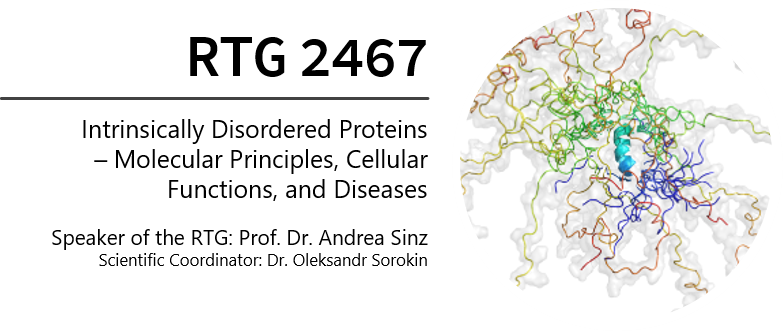
received a degree in Pharmacy from the University of Tübingen, Germany, in 1993. She obtained her PhD in Pharmaceutical Chemistry from the University of Marburg, Germany, in 1997. From 1998-2000, she was a post-doctoral fellow at the National Institutes of Health in Bethesda, MD, USA, where she became introduced into chemical cross-linking techniques and protein mass spectrometry. After research stays at the Universities of Gießen and Rostock, she became head of a junior research group at the University of Leipzig, Germany (2001-2006). Since 2007, she is Full Professor and head of the Department of Pharmaceutical Chemistry and Bioanalytics at the MLU. She is an expert in chemical cross-linking and mass spectrometry for studying protein conformations and protein-protein interactions. Her research interests are the development of novel analytical strategies and reagents to advance the cross-linking/MS approach. From 2017 to 2020, she was president of the German Society for Mass Spectrometry (DGMS). She is the spokesperson of the RTG 2467.

studied Biotechnology at the University of Braunschweig, Germany, where he obtained his PhD in 2000. Initially staying on as a postdoctoral research associate, he moved to the Albert-Einstein-College of Medicine, New York City, USA, in 2001 where he began to work on the role of RNA-binding proteins (RBPs) in controlling cytoplasmic mRNA fate. In 2004, he started his own research team as a junior group leader at the MLU in Halle and in 2009 he accepted a position as Associate Professor for Molecular Cell Biology. In 2010 he became the speaker of RTG 1591 “Posttranscriptional Control of Gene Expression” and in 2014 he was promoted to a Full Professor. He is also the director of the Core Facility Imaging that is located at the new Charles Tanford Protein Center. His current research focuses on the role of RBPs in cancer.
Project within the RTG
The role of intrinsically disordered RNA-binding proteins MEX3B-D in cancer-associated protein ubiquitination
The human MEX3 family of RNA-binding proteins (RBPs) comprises four members, MEX3A-D, that exert distinct roles in development and cancer (Lederer et al., 2021; Jasinski-Bergner, Steven, & Seliger, 2020). All human MEX3 proteins comprise two variable IDRs, two conserved HNRNPK-homology (KH) domains, and a C-terminal RING domain. MEX3A-C are oncofetal-like proteins with substantially elevated abundance in carcinomas (Lederer et al., 2021; Jasinski-Bergner, Steven, & Seliger, 2020). All MEX3 proteins associate with mRNAs and long non-coding (lnc) RNAs, control mRNA turnover and modulate protein ubiquitination in a partially RNA-dependent manner. Presumably associated with their function in (m)RNA decay and high (~39-63%) IDR content, MEX3 proteins are enriched in processing bodies, membrane-less protein-RNA granules, which are implicated in the cytoplasmic control of (m)RNA fate. MEX3-dependent control of protein ubiquitination and its potential link with the regulation of mRNA fate remains poorly understood. Notably, MEX3C directs poly-ubiquitination of PTEN in a lncRNA-dependent manner. This reprograms PTEN’s phosphatase activity, resulting in aberrant de-phosphorylation of EMT-driving (epithelial-to-mesenchymal transition) transcription factors and elevated EMT (Li et al., 2019), a hallmark of cancer progression.
Literature references
Jasinski-Bergner, S., Steven, A., & Seliger, B. (2020). The role of the RNA-binding protein family MEX-3 in tumorigenesis. International Journal of Molecular Sciences, 21(15), 5209. Lederer, M., Müller, S., Glaß, M., Bley, N., Ihling, C., Sinz, A., & Hüttelmaier, S. (2021). Oncogenic potential of the dual-function protein MEX3A. Biology, 10(5), 415.
Li, Y., Hu, Q., Li, C., Liang, K., Xiang, Y., Hsiao, H., … & Lin, C. (2019). PTEN-induced partial epithelial-mesenchymal transition drives diabetic kidney disease. The Journal of Clinical Investigation, 129(3), 1129-1151.
Yoshida, Y., Saeki, Y., Tsuchiya, H., & Tanaka, K. (2019). Detection of ubiquitination activity and identification of ubiquitinated substrates using TR-TUBE. Methods in Enzymology, 618(2019), 135-147.
Website: http://agsinz.pharmazie.uni-halle.de & https://www.medizin.uni-halle.de/einrichtungen/institute/molekulare-medizin/forschung/ag-molekulare-zellbiologie & https://www.medizin.uni-halle.de/cfi
